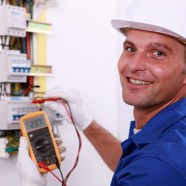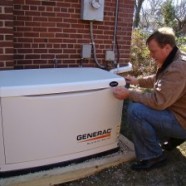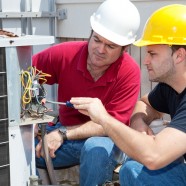Do You Need an Electrical Preventive Maintenance Program?
A Commercial Electrical Contractor will be able to provide you with one.
Whether you’re running a medical clinic or a gourmet restaurant, the majority of your equipment runs on electrical power. Trouble with your electrical system can run the gamut from annoying, as with a blown light bulb, to the crucial when you need medical equipment to be available for sick patients. You can install a backup generator to get you back up and running in case of a power outage, but what about preventing other electrical problems? An electrical preventive maintenance program, or EPM, will prevent almost all the foreseeable trouble you might encounter with any of your electrical systems and equipment. A commercial electrical contractor will be able to answer questions you may have about setting up your own program.
Safety
Electrical equipment is one of the three most common causes of fire in all businesses. Fires cause millions of dollars in damage every year, but more importantly, they’re a danger to employees and firefighters. Most fires can be prevented by investigating wiring and electrical systems in the business, and repairing or replacing frayed wires and other damaged equipment. Wear and tear on equipment is normal, and starts the minute you install it in your business. The only way to know when your equipment has worn to the point of being dangerous is by scheduling an electrical preventive maintenance program.
Benefits
Installing an EPM program into your monthly schedule may seem like an intrusive and time-consuming chore, but the benefits far outweigh the costs in every case.
- It reduces accidents and fires and could save lives
- It controls the costs of repairs and equipment replacement. Costs are spread out over time instead of you being hit with one large, unexpected bill
- It increases the chances of your having breakdown-free days. If a breakdown does occur, your business downtime is usually significantly shorter.
- It maintains your equipment at its highest operating efficiency
- It can improve employee morale. Team members know you value them enough to take care of your work environment, and they aren’t as worried about equipment breaking down and interrupting their work day
Things to Consider
Creating an EPM program isn’t an invisible, behind-the-scenes process. It takes time and effort on the part of employees and management alike, but it’s much less disruptive than a power outage or sitting through downtime on a major piece of equipment. Every business is different, but you can expect it to take about six hours every month to complete. If you have an interruption-sensitive business with customers that walk in your door, you’ll have to schedule people to stay after normal closing time to work with the commercial electrical contractor.
The cost of the program will depend on the age and condition of all the electrical equipment in the building. You and the contractor will consider things such as equipment condition, the possibility of product spoilage when systems are down, changes in system loads due to increased business, and the local weather patterns when you sit down to finalize your plan. It’s a very personalized process, and one which can only be planned out after a thorough inspection of your entire business. Once the plan is made, you can expect at minimum for the contractor to inspect the wiring, circuit breakers, connections to HVAC systems, and any piece of electrical equipment you may use including POS systems. He’ll check for condition and safety in every part of your business, and repair any parts that appear to be wearing out, to ensure that your business will continue to run safely.
Read More6 Top Tips for Standby Generator Maintenance
Power outages can range from 2-minute inconveniences to blackouts that last multiple days. The shorter ones can be slightly annoying, but longer blackouts can affect your business or your quality of life. The best way to avoid shutting your business down or suffering through bad weather due to a blackout is to install a standby generator to supplement your basic electrical system. Like any other piece of electrical machinery, generators need to be maintained on a regular basis to keep them in good working order. If you want your standby generator to be reliable in a blackout, you have to be reliable in the care you give it the rest of the year.
Tip #1: Read the Owner’s Manual
Every generator has a slightly different set of procedures for its regular maintenance schedule. Before trying any form of mechanical work on your standby generator, read the manual to find the model-specific advise it offers.
Tip #2: Conduct a Visual Inspection
Whether you have a built-in generator or a portable model, you should visually inspect it on a regular basis. Look for leaves and other plant debris that may have blown into the body that may clog operations. Try spotting puddles of oil and coolant to make sure leaks haven’t developed. Make sure the exhaust port is open and free of clogs.
Tip #3: Change the Oil Regularly
You probably wouldn’t drive your car for a year without changing the oil. The same thing applies to the motor in your standby generator. The oil inside has to be changed on a regular basis, especially after being used for any length of time. After a lengthy period of use, allow the generator to cool down for at least 48 hours. Check the oil to see if it needs changing.
If the oil needs changing, empty out the old oil and replace it with 2 quarts of new. You can use natural oil or synthetic, but synthetic oil works better in extreme cold and higher heat, so it may be a better choice. While you’re changing the oil, change out the old, dirty oil filter and replace it with a fresh one.
Tip #4: Pull the Spark Plugs
Spark plugs can get dirty and corroded in a generator, even with light use. Pull the plugs in yours after one year and compare them to a set of new ones. You’ll probably find that the old set is covered in brown and black corrosion. Replace all the spark plugs with a new set, then mark your calendar to remind yourself to do the same thing next year.
Tip #5: Replace the Air Filter
You know how dirty the air filter gets in a car or your home furnace. Accumulated dust and dirt will eventually clog the air passages, preventing fresh air to move through. Depending on the air quality in your environment, you may have to replace the air filter in your standby generator twice a year or every two years. It’s a simple procedure – just open the cover, slip out the old filter and slide in a new one.
Tip #6: Run the Engine
Start and run your standby generator every month. Let it run until the temperature stays the same for at least 10 minutes. This will allow the oil to circulate throughout the engine, lubricating the parts, and will ensure that no leaks or cracks in the exhaust are beginning to form.
At the absolute minimum, standby generator maintenance is something you should do at least once every two years, or after 200 hours of constant use. Never using the generator is not an excuse for leaving it alone for years at a time. Doing that will almost guarantee that it will fail you when you need it most.
Read MoreHow to Achieve HVAC Energy Savings for Your Home
The percentage of energy you use changes depending on whether you live in southeast Florida or the northern tip of Maine, but about half of the total energy you use in your home goes directly to air conditioning and heating costs. Heating, ventilation and air conditioning, or HVAC, is also one of the most obvious ways in which to save money on home energy bills. Its usage is such a large chunk of your total energy costs, even changes that result in small percentages of savings can make a big difference. It’s the simple things that count, and taking care of small tasks that most people overlook is a great way to find HVAC energy savings all year long.
A New Thermostat
Older thermostats are often inaccurate due to extended use, plus they’re static machines. Set a thermostat at 68 degrees, and that’s where it will stay. Newer programmable thermostats have the ability to be more flexible. You program in the temperature you want during the day when you’re home, then set the temperature back another few degrees for when you’re sleeping or at work. You’ll save money by not heating or cooling the building while you’re not there, or when you’re under your covers or in front of a fan, then the thermostat’s timer will turn the temperature back to normal just in time for your home to be comfortable when you arrive. It’s a simple job for a commercial electrician to install a programmable thermostat, and the savings can pay for it in just a few months.
The Air Filter
Pull out your air filter every month and check to see if it’s dirty. If it’s soiled, throw it away and replace it with a new, clean version. Replace the filter at least every three months, but you may need a monthly replacement during heavy usage times in the heat of summer or the middle of winter. A clogged filter doesn’t allow air to pass through as easily, making the machine work harder and using more energy in the process. Replacing the air filter on a regular basis will extend the life of your HVAC system, putting off any repair or replacement costs to farther in the future.
Heating and Cooling Ducts
You can have a very well-insulated home, but if the ducts to your heating and cooling system aren’t sealed properly you’re going to lose energy from multiple points in your home. Concentrate first on the ducts that run through the harshest weather spots in your home: the attic, the crawlspace, the basement, or through an unheated garage. Use metal-backed or foil tape, or duct sealant, to seal all the seams and connections to these ducts. After they’ve been sealed, wrap them in ductwork insulation to keep them from getting hot in the summer and cold in the winter. After these ducts have all been sealed properly, find and seal any ducts in the main portion of the house.
ENERGY STAR Equipment
If your appliances are more than 10 years old, it may be time to replace them for a better running and more energy-efficient model. Do your research and compare energy usage between different models. Often the less expensive model of a refrigerator or backup generator is more expensive in the long run than those with ENERGY STAR certification. The same holds true for a new HVAC system for your home. Installing a more efficient heating and cooling system can give you significant HVAC energy savings throughout the year.
Upgrade Lighting Systems
Older fluorescent lights, as well as incandescent bulbs, put out a lot of heat while they’re being used during the day. This can result in the ambient temperature in your home or business to go up, causing the air conditioner to have to work harder. Newer LED lights are more efficient because they use less power to create the same amount of light, and they also give off a small fraction of the heat that older lighting styles do. Replace all your old bulbs with newer energy-efficient LED lights to decrease the temperature inside.
Read More4 Reasons to Hire an Independent Electrical Contractor
New construction and renovation both require contractors with numerous building skills, such as:
- drywall
- plumbing
- painting, and
- electricity
General contracting companies are designed to offer all the services you need in order to create and complete your building plans, without the bother of dealing with multiple companies and multiple billing methods. With all that competence and lack of complications, why would anyone choose to hire an independent electrical contractor?
There’s more to a successful building project than simplicity, and a dedicated electrical contractor can bring more to the table than most general contractors can think of doing. Here are some of the top reasons for hiring one:
Reason #1: Cost
It may seem as if hiring a separate contractor to do your electrical work is an expensive way to contract out your project, but in most cases you’ll end up with the same cost, or even saving money. For all but the most basic of jobs, a general contractor will have to sub-contract out the electrical work on a renovation or new construction job. Once they do that, the general contractor will pay the electrical contractor, then pass the cost on to you, generally adding on a fee for doing the paperwork of sub-contracting. Hiring the electrical contractor yourself bypasses any extra fees your general contractor might charge.
Reason #2: Expertise
Just as specialists are more knowledgeable about their specialties than general physicians, independent electrical contractors are better informed about all forms of electrical work than general contractors would be.
Those that specialize in electrical work have the education and experience to safely complete the most complicated residential or commercial electrical project. If you’ve got a tricky job of wiring to do, or need advice on writing up plans for a renovation, a professional electrical contractor is the right choice.
Reason #3: Knowledge and Education
General contractors have to show some knowledge and experience in multiple disciplines, but licensed electrical contractors have to take involved classes as well as experience hands-on training before attempting to take the test for their license. Continuing education classes are a normal part of their career, which keeps electricians up-to-date with the latest in technology, work methods, building codes, and materials.
General contractors simply don’t have the time to keep current on all the specialties they deal with, and they rely on specialists to let them know when big changes occur in the industry. When it comes to new safety procedures, money-saving technology, and efficient building methods, it’s more likely you want to hire the contractor who is constantly learning about his profession instead of the one who learns about it second hand.
Reason #4: Innovation and Creativity
When it comes to renovating a building or building a new home or business, you want the best you can find, and not just the basics. General contractors are good at following plans set out, but rarely have the knowledge or education to suggest creative or innovative alternatives to the basic plans you have in mind.
An independent electrical contractor knows enough about the business to help you change your plans, and to explain why you need to do so. He’ll let you know about the local lightning rates and show you why you need a subtle set of air terminals, or lightning rods, attached to the roof of your building. He can suggest alternate green technology that you may never have heard about before. He also knows the building codes that apply to any project you may begin, and he can tell you whether your plans fit in with the codes, or how to change them if they don’t. In short, he’ll be more of a partner in your electrical project, and not just a tradesman doing the work after the fact.
Read MoreRequirements for Electrical Companies in South Florida to Succeed
They may not have to deal with the effects of lake-effect snowstorms, but electrical companies in South Florida have weather issues of their own they have to work through. Like professionals in any area, South Florida electricians must be experts at dealing with the unique problems their environment poses, while maintaining the highest professional standards. Much of South Florida is under renovation and gentrification, and local electricians must be expert at upgrading older wiring and fixtures while still retaining the flavor of older historic buildings and neighborhoods. These professionals must have the training and experience of electricians in any other part of the country, but should also have specialized knowledge of the problems unique to the South Florida area.
Alternate Power Supplies
Between lightning storms, hurricanes, tropical storms, and an aging infrastructure, South Florida is subject to power outages on an increasing basis. Homeowners can be inconvenienced by this, but businesses bear the brunt of a power outage simply by being shut down until the power comes back on. Electrical companies in South Florida have to be experts in backup generators, installing alternate power supplies for homes and businesses. They know the amount of power needed for a bare minimum in a household simply to keep the freezer and lights going, all the way up to a permanent installation that can power a health clinic or emergency community cooling station.
Lightning Protection
Florida has more lightning strikes per square mile than any other state in the country, and the South Florida area gets its fair share of strikes. A lightning bolt hitting a building can cause physical injury, damage to electrical systems and even fire if it’s not dealt with correctly. Air terminals, which used to be called lightning rods, can redirect the power from a lightning bolt to a buried grounding spot away from a building. South Florida electrical companies know how to calculate the correct number of air terminals according to a building’s square footage and height. They are also experts at installing surge suppression for delicate machinery and equipment inside homes and businesses, to prevent expensive data loss and systems failures in the case of an electrical storm in the neighborhood.
Renovation
While the basics of electrical renovation may be similar throughout the country, electrical companies in South Florida have some special considerations to keep in mind when doing their job. The area’s stucco walls, curved shapes, Art Deco flavor, and pastel tones are unique to this part of the country, and it’s a flavor that clients want to preserve when redoing the bones of a building. Local electricians know how to update older wiring that may be corroded by constant contact with salt air, while preserving the look and feel of a Jazz age neighborhood.
New Construction
Electrical companies in this area are more aware of the effects of weather on their construction than in many other parts of the country. They know about the problem of lightning strikes, so they must design air terminals into their wiring plans. Power outages are a fact of life in South Florida, so a backup power supply is a common addition to their plans. The year-round warmth inspires many residents to install elaborate landscaping, so outdoor lighting of all types is a large part of many wiring plans, and ceiling fans are the norm in almost every room in a house. Commercial electricians know to insulate wiring extremely well to help eliminate the problems with salt water corrosion, and they acknowledge that this is a growing area of the state, so they build a job with the next ten years in mind.
Read More





Recent Comments